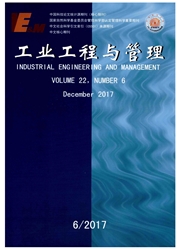

 中文摘要:
中文摘要:
以博弈论为基本研究方法,考查了制造商、销售商和第三方物流服务商构成的Stackelberg再制造闭环供应链中,节点企业为了取得最优利润,如何确定产品的批发价、销售价,废旧产品的回收价和回收转移价等,发现在分散决策(非合作博弈)下系统的利润要低于集中决策(合作博弈)下系统的利润。通过设计收入费用共享契约,增加了产品的销售量和废旧产品的回收量,提高了制造商、销售商、第三方物流服务商的利润和消费者的效用,实现了Stackelberg再制造闭环供应链系统的协调。
 英文摘要:
英文摘要:
In this paper,we address how the agents make their price decision including wholesale price,retail price,collection price and return transfer price in the Stackelberg closed-loop supply chain(SCLSC) with product remanufacturing composed of manufacturer,retailer and third-party logistics provider based on game theory.It's indicated that the system profit in the decentralized SCLSC is less than in the centralized SCLSC.Therefore,a revenue-and-expense sharing contract is presented to coordinate the SCLSC.The result shows revenue-and-expense sharing contract can increase product sale quantity and used product recovery quantity,enhance SCLSC profit and customer utility.
 同期刊论文项目
同期刊论文项目
 同项目期刊论文
同项目期刊论文
 期刊信息
期刊信息
